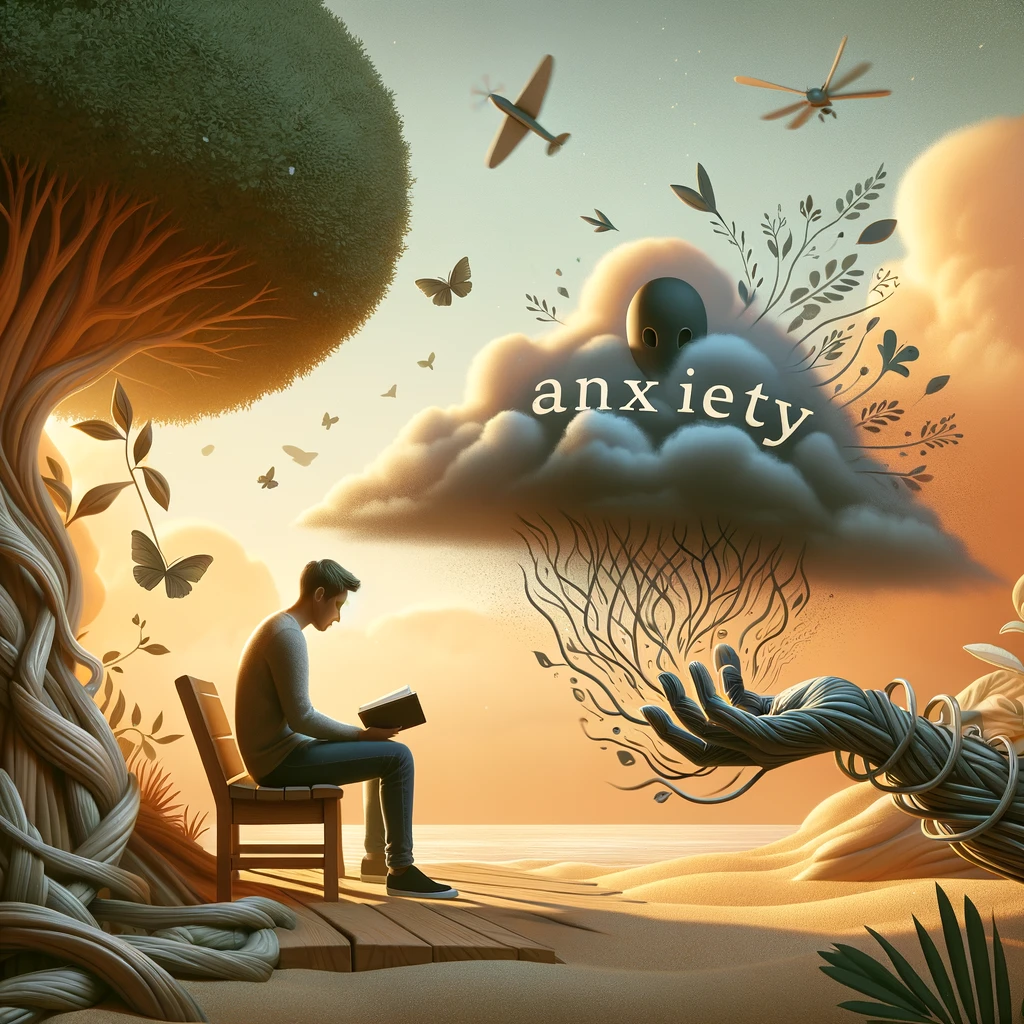Anxiety can make everyday life very difficult, but luckily, Cognitive Behavioral Therapy (CBT) offers a promising way to help people manage their anxiety. CBT reduces symptoms associated with mental health issues, including teaching people how to recognize and manage negative thinking patterns and developing coping strategies. In this article, we will discuss how Cognitive Behavioral Therapy can help you conquer anxiety, how to recognize negative thinking patterns, and how to reclaim your life and live with less stress and fear.
Table of Contents
- How Cognitive Behavioral Therapy Can Help You Conquer Anxiety
- Recognizing Negative Thinking Patterns and Working to Change Them
- Reclaiming Your Life and Living with Less Stress and Fear
- Conclusion: Using Cognitive Behavioral Therapy for Anxiety
- Frequently Asked Questions About Cognitive Behavioral Therapy for Anxiety
- About Dr. Gary Danko
- Connect with Dr. Danko
- Related Articles
How Cognitive Behavioral Therapy Can Help You Conquer Anxiety
CBT is a type of psychotherapy that involves instructor-led talk therapy along with exercises and activities to help people understand their thought patterns and challenge negative beliefs. It has proven to be highly effective in treating anxiety and other psychological issues. During CBT sessions, individuals learn to recognize unhealthy thinking patterns and develop tools for responding differently to their worries and fears. Furthermore, CBT practice can help build emotional resilience, improve self-esteem, and develop better coping skills. Some of the cognitive strategies used in CBT target challenging thoughts that lead to negative emotional states. People learn to recognize and review their thoughts, identify what is and is not working for them, and set goals for change. By learning to observe one’s own thinking processes and use them to modify behavior, individuals can better conquer anxiety and go on to live a healthier and more effective life.
Recognizing Negative Thinking Patterns and Working to Change Them
It is important to recognize your own negative thinking patterns and then work to challenge and change them. CBT helps people recognize when they are engaging in unhelpful thought patterns and how to replace them with healthy ones. For example, someone may become anxious when they have to speak in front of a large group, and may start to tell themselves things like “everyone is going to laugh at me” or “I’m going to mess up”. But with CBT, they can learn to recognize these thoughts, actively challenge them, and develop healthier coping strategies. Some tips for recognizing and managing negative thought patterns include:
- Scan for evidence: check for evidence for and against your negative thought pattern. Are your anxieties actually valid?
- Challenge the thought: ask yourself if there is another way of looking at the situation (e.g. “maybe the audience will be interested in what I have to say”)
- Look at cause and effect: consider the real impact of your thoughts (e.g. if your fear is unrealistic, then what is it costing you emotionally?).
By trying out different approaches and actively challenging our negative thoughts, we can learn to respond to life, situations, and our thoughts in healthier ways, thus helping us to conquer anxiety.
Reclaiming Your Life and Living with Less Stress and Fear
By mastering the strategies and tools taught by Cognitive Behavioral Therapy, you can start to reclaim your life and live with less stress and fear. Through practicing CBT, you can increase self-efficacy, reduce anxiety, and improve your quality of life. CBT can help you identify what you need to do to better manage your anxiety, including managing your environment, developing mindful and relaxation techniques, setting realistic goals, and weighing the pros and cons of your choices before making a decision. Through actively learning to identify and change negative thought patterns, you can learn how to live a more fulfilling, healthy, and anxiety-free life.
Conclusion: Using Cognitive Behavioral Therapy for Anxiety
Cognitive Behavioral Therapy can help you conquer anxiety by teaching you how to recognize and manage negative thought patterns, develop healthier coping strategies, and reclaim your life. By using the tools and strategies taught by CBT, you can improve your quality of life, reduce symptoms of anxiety, and live a more meaningful life free from stress and fear.
Frequently Asked Questions About Cognitive Behavioral Therapy for Anxiety
Q: What is Cognitive Behavioral Therapy (CBT) for Anxiety?
A: Cognitive Behavioral Therapy (CBT) for anxiety is a highly effective psychological treatment. It focuses on identifying and challenging negative thought patterns and behaviors associated with anxiety, replacing them with more rational, positive ones.
Q: What are the 5 Steps of CBT for Anxiety?
A: The five key steps of CBT for treating anxiety include:
- Identifying Negative Thoughts: Recognizing thoughts contributing to anxiety.
- Challenging Negative Thoughts: Evaluating these thoughts critically.
- Gaining Awareness of Feelings and Behaviors: Understanding the impact of thoughts on feelings and actions.
- Developing New Thoughts: Replacing negative thoughts with positive ones.
- Applying New Skills: Practicing these skills in real-life situations.
Q: How to Do CBT by Yourself for Anxiety?
A: Self-guided CBT involves:
- Educating Yourself: Understanding anxiety and CBT principles.
- Self-monitoring: Keeping a journal to track thoughts, feelings, and behaviors.
- Problem Solving: Tackling anxiety-inducing situations systematically.
- Relaxation Techniques: Practicing mindfulness or deep breathing.
- Positive Activities: Engaging in activities that boost mood and well-being.
Q: What is an Example of a CBT Treatment for Anxiety?
A: A common CBT technique is **exposure therapy,** where individuals gradually face their fears in a controlled environment, reducing anxiety over time.
Q: What is the Success Rate of CBT for Anxiety?
A: Research indicates that CBT has a high success rate for treating anxiety, with about 70-80% of individuals showing positive results.
Q: How Long Does It Take to Treat Anxiety with CBT?
A: The duration varies but typically involves 10-20 sessions over several weeks or months, depending on individual needs.
Q: What is the Gold Standard Treatment for Anxiety?
A: CBT is often considered the **gold standard** non-pharmacological treatment for anxiety due to its effectiveness and evidence-based approach.
Q: Does CBT Stop Panic Attacks?
A: Yes, CBT is effective in reducing the frequency and intensity of panic attacks by changing the thought patterns that trigger them.
About Dr. Gary Danko
Dr. Gary Danko, PhD, is a renowned expert in metaphysical psychology and a certified hypnotherapist based in Clearwater, Florida. With a profound commitment to fostering wellness, Dr. Danko specializes in unlocking the human mind’s potential, guiding individuals towards a healthier, happier, and more fulfilling life. His holistic approach integrates spirituality, physical health, and mental well-being, offering a unique perspective on personal growth. Passionate about deep, meaningful conversations, Dr. Danko explores the intricacies of the human spirit and mind, providing insights that enlighten and inspire.
Connect with Dr. Danko
Are you ready to embark on a journey towards a more fulfilling life? Discover the transformative power of metaphysical psychology and hypnotherapy with Dr. Gary Danko. Schedule your Free Discovery Session today and take the first step towards unlocking your true potential. Whether you’re seeking spiritual growth, mental clarity, or physical well-being, Dr. Danko’s expertise will guide you on the path to success. Don’t miss this opportunity to transform your life. Contact Dr. Danko now for your free session and experience the change you’ve been longing for!
Related Articles
Cognitive Behavioral Therapy: A Closer Look
Enhance Your Self Esteem with CBT and Hypnosis
Unlock Successful Weight Loss: Discover the Power of CBT!
Unlocking Freedom from Anxiety with Hypnotherapy
Empower Your Mind: How Hypnotherapy Alleviates Anxiety



Add your first comment to this post
You must be logged in to post a comment.